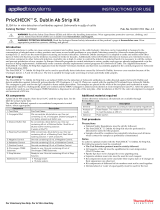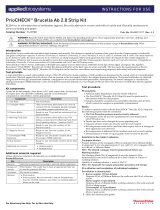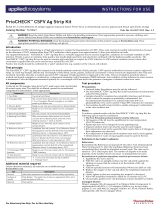Page is loading ...

For Veterinary Use Only. For In Vitro Use Only.
INSTRUCTIONS FOR USE
PrioCHECK™ Porc. Salmonella Ab 2.0 Plate Kit
ELISA for
in vitro
detection of antibodies against
Salmonella
in plasma and serum of pigs
Catalog Number 7610670
Pub. No. MAN0018732 Rev. B
.0
WARNING! Read the Safety Data Sheets (SDSs) and follow the handling instructions. Wear appropriate protective eyewear, clothing, and
gloves. Safety Data Sheets (SDSs) are available from thermofisher.com/support.
WARNING! POTENTIAL BIOHAZARD. Read the biological hazard safety information at this product’s page at thermofisher.com. Wear
appropriate protective eyewear, clothing, and gloves.
Introduction
Salmonellosis is one of the most important zoonotic diseases, causing serious clinical signs in human beings. Pigs have been recognized as an important
source for these Salmonella infections. Especially infected pig herds constitute a public health risk as a source of contamination of meat at slaughter.
Surveillance and diagnosis of infected pig herds can be easily achieved by testing for Salmonella antibodies in serum or meat juice. The Applied Biosystems™
PrioCHECK™ Porc. Salmonella Ab 2.0 Plate Kit originates from the Danish Veterinary Institute (Nielsen et al., 1995) and has been successfully applied in the
control program for Salmonella in pigs in Denmark. Additionally, the ELISA is often used as the Gold Standard in the development of other Salmonella
ELISAs [1].
The PrioCHECK™ Porc. Salmonella Ab 2.0 Plate Kit can be used to detect infection in pigs caused by Salmonella strains belonging to the serogroup B, C1 and
D (the most common serotypes isolated in Europe, Asia and America). The test is suitable for large-scale screening and for application in control programs
of Salmonella infections in swine [1,2].
Test principle
The PrioCHECK™ Porc. Salmonella Ab 2.0 Plate Kit is an indirect ELISA for the detection of Salmonella antibodies in swine and detects antibodies against
Salmonella polysaccharide LPS O-antigens 1, 4, 5, 6, 7 and 12. Plates are coated with the purified LPS isolated from S. Typhimurium and S. Choleraesuis. The
conjugate is rabbit anti-swine serum coupled to horse radish peroxidase.
Test samples are pre-diluted in a dummy plate and transferred to the corresponding wells of the test plate and incubated at room temperature (22±3°C).
Subsequently plates are washed and the HRPO conjugate is added and incubated at 22±3°C. After the plates are washed the ready-to-use Chromogen
(TMB) Substrate is dispensed to all wells of the Test Plate. After incubation at 22±3°C the color development is stopped and measured at 450 nm.
Kit components
50 plate kit for 4500 samples. Store kit at 5±3°C until the expiry date. See kit
label for actual expiry date. The shelf life of diluted, opened, or
reconstituted components is noted below, where appropriate.
Component
Description
1: Test Plate
Fifty Test Plates
2: Conjugate (30x)
30x concentrate, dilute before use. Two vials
containing 12 mL of Conjugate. Shelf life of
diluted conjugate: 24 hours at 22±3°C.
3: Dilution Buffer (5x)
5x concentrate, dilute before use. One vial
containing 500 mL of Dilution Buffer. Shelf
life of dilution buffer working solution:
24 hours at 22±3°C.
4: Washing Fluid (100x)
100x concentrate, dilute before use. Four
vials containing 60 mL of Washing Fluid. Shelf
life of washing solution: 1 week at 22±3°C.
5: Negative Control
Ready-to-use. One vial containing 1.5 mL of
Negative Control.
6: Validation Control
Ready-to-use. One vial containing 1.5 mL of
Validation Control.
Note: Use of this control is optional.
7: Positive Control
Ready-to-use. One vial containing 1.5 mL of
Positive Control.
8: Chromogen (TMB)
Substrate
Ready-to-use. One vial containing 500 mL and
one vial containing 60 mL of Chromogen
(TMB) Substrate.
9: Stop Solution
Ready-to-use. One vial containing 500 mL and
one vial containing 60 mL of Stop Solution.
Additional kit contents
Package Insert
Additional material required
Unless otherwise indicated, all materials are available through
thermofisher.com.
Use
Description
Pre-dilution
Dummy plates to make pre-dilutions of the plasma and serum
samples. We recommend U-bottom shaped plates
(Cat. No. 267245). However, also other non-binding plates or
tubes can be used.
General
Laboratory equipment according to national safety regulations.
Analysis of
results
Plate reader. The reader has to have an appropriate filter set to
read the plates at 450 nm.
Optional
Plate washer.
Test procedure
Precautions
• National Safety Regulations must be strictly followed.
• The PrioCHECK™ Porc. Salmonella Ab 2.0 Plate Kit must be performed
in laboratories suited for this purpose.
• Samples should be considered as potentially infectious and all items
which contact the samples as potentially contaminated.
Notes
To achieve optimal results with the PrioCHECK™ Porc. Salmonella Ab 2.0
Plate Kit, the following aspects must be considered:
• The Test Procedure protocol must be strictly followed.
• It is recommended to use 6 times washing if the assay is run on a
robotic system.
• All reagents of the kit must be equilibrated to room temperature
(22±3°C) before use.
• Pipette tips have to be changed for every pipetting step.
• Separate solution reservoirs must be used for each reagent.
• Kit components must not be used after their expiry date or if changes in
their appearance are observed.
• Kit components of different kit lot numbers must not be used together.
• Demineralized or water of equal quality must be used for the test.
Solutions to be made in advance
Dilution buffer working solution
The Dilution Buffer (Component 3) must be diluted 5 times in demineralized
or distilled water. To perform a test with one plate, prepare 45 mL (add 9 mL
Dilution Buffer (5x) to 36 mL demineralized or distilled water).
Stability of dilution buffer working solution: 24 hours at 22±3°C.

2 PrioCHECK™ Porc. Salmonella Ab 2.0 Plate Kit Instructions for Use
Conjugate dilution
Prepare dilution of the Conjugate (Component 2) in dilution buffer working
solution. To perform a test with one plate, prepare 12 mL (add 0.4 mL
concentrated Conjugate (30x) to 11.6 mL of dilution buffer).
Note: The diluted conjugate is stable up to 24 hours.
Washing solution
The Washing Fluid (Component 4) must be diluted (100x) in demineralized
or distilled water and is sufficient for a final volume of 6 liters. To perform
a test with one plate prepare 500 mL (add 5 mL Washing Fluid (100x) to
495 mL demineralized or distilled water).
Stability of washing solution: 1 week stored at 22±3°C.
Pre-dilution of the test samples 20x in a dummy plate
1. Dispense 10 µL of each test sample to the appropriate wells of the
dummy plate (see Table 1).
Note: Test samples can be added to one well (single test) or two adjacent
wells (duplicate test), depending on your experimental requirements.
2. Dispense 190 µL of the dilution buffer working solution to each
sample-containing well, then mix the contents of the wells.
3. Shake the dummy plate(s) for 1 minute at 700 RPM (1/min).
Note: Mixing the sample with the dilution buffer working solution is
essential for the test.
Incubation of control and test samples
For the recommended Test Plate layout, see Table 2.
1. Label each column of the Test Plate (Component 1) with a permanent
marker.
2. Dispense 90 µL of the dilution buffer working solution to all wells of
the Test Plate.
3. Transfer 10 µL of each pre-diluted sample from the dummy plate to the
corresponding wells of the Test Plate.
4. Dispense 10 µL of the Negative Control (Component 5) to wells A1 and B1.
5. Dispense 10 µL of the Positive Control (Component 7) to wells C1 and D1.
6. (Optional) Dispense 10 µL of the Validation Control (Component 6) to
wells E1 and F1.
7. Shake the plate(s) for 1 minute at 700 RPM (1/min).
8. Incubate the Test Plate(s) for 30±3 minutes at room temperature
(22±3°C).
Incubation with conjugate
1. Empty the Test Plate, then wash the plate 3 times with 200–300 µL of
diluted washing fluid. Tap the plate firmly after the last wash cycle.
2. Dispense 100 µL of the working solution of the conjugate to all wells.
3. Incubate the plate(s) for 30±3 minutes at room temperature (22±3°C).
Incubation with Chromogen (TMB) Substrate
1. Empty the Test Plate, then wash the plate 3 times with 200–300 µL of
diluted washing fluid. Tap the plate firmly after the last wash cycle.
2. Dispense 100 µL of the Chromogen (TMB) Substrate (Component 8) to
all wells.
3. Incubate the plate(s) 15±1 minutes at (22±3°C).
4. Add 100 µL of the Stop Solution (Component 9) to all wells.
5. Mix the content of the wells of the plate(s).
Note: Start the addition of stop solution 15 minutes after the first well was
filled with the Chromogen (TMB) Substrate. Add the Stop Solution in the
same order and at the same pace as the Chromogen (TMB) Substrate was
dispensed.
Reading of the test and calculating the results
1. Measure the optical density (OD) of the wells at 450 nm preferable
within 15 minutes after color development has been stopped.
2. Calculate the mean OD450 value of the Positive Control (wells C1 and D1).
3. Calculate the mean OD450 value of the Negative Control (wells A1 and B1).
4. Calculate the corrected OD450 value of the Positive Control, Validation
Control (if used), and all samples by subtracting the mean OD450 of the
Negative Control (wells A1 and B1).
5. Calculate the percent positivity (PP) of all controls and of the test
samples according to the formula below.
The OD450 of all samples is expressed as percent positivity (PP) of the
Positive Control (PC) (wells C1 and D1) corrected with the mean OD450 of
the Negative Control (NC) (wells A1 and B1).
PP = OD450 test sample - Mean OD450 NC
OD450 PC - Mean OD450 NC × 120
Result interpretation
Validation criteria
1. The mean OD450 of the Negative Control (wells A1 and B1) must be <0.4.
2. The OD450 of the Positive Control (not corrected) should be >1.0.
3. If the Validation Control was used, the percent positivity of the
Validation Control must be ≥60.
Not meeting these criteria is reason to discard the results of that specific test
plate.
Note: If the OD450 of the Positive Control (not corrected) is below 1.0
possibly the Chromogen (TMB) Substrate is too cold. In that case pre-warm
the solution to 22±3°C or incubate up to 30 minutes.
Interpretation of the percent positivity
PP <40% Negative
Salmonella
-specific antibodies are absent in
the test sample.
PP ≥40% Positive
Salmonella
-specific antibodies are present in
the test sample.
In well-advanced Salmonella control programs the test can be used with a
different cut-off (e.g. 20% PP). It remains in the responsibility of the
respective authorities/users to implement such cut-offs.
Recommended plate layouts
The following plate layouts allow for efficient transfer of pre-diluted samples
from the dummy plate to the Test Plate (X — Empty; S — Sample; P — Positive
Control; N — Negative Control; V — Validation Control (optional)).
Table 1 Dummy plate layout
1
2
3
4
5
6
7
8
9
10
11
12
A
X
S
S
S
S
S
S
S
S
S
S
S
B
X
S
S
S
S
S
S
S
S
S
S
S
C
X
S
S
S
S
S
S
S
S
S
S
S
D
X
S
S
S
S
S
S
S
S
S
S
S
E
X or S(1)
S
S
S
S
S
S
S
S
S
S
S
F
X or S(1)
S
S
S
S
S
S
S
S
S
S
S
G
S
S
S
S
S
S
S
S
S
S
S
S
H
S
S
S
S
S
S
S
S
S
S
S
S
(1) If you are using the Validation Control, leave wells E1 and F1 empty.
Table 2 Test Plate layout
1
2
3
4
5
6
7
8
9
10
11
12
A
N
S
S
S
S
S
S
S
S
S
S
S
B
N
S
S
S
S
S
S
S
S
S
S
S
C
P
S
S
S
S
S
S
S
S
S
S
S
D
P
S
S
S
S
S
S
S
S
S
S
S
E
V or S
S
S
S
S
S
S
S
S
S
S
S
F
V or S
S
S
S
S
S
S
S
S
S
S
S
G
S
S
S
S
S
S
S
S
S
S
S
S
H
S
S
S
S
S
S
S
S
S
S
S
S
References
1. Nielsen B, Baggesen D, Bager F, Haugegaard J, Lind P (1995). Veterinary
Microbiology 47:205–218.
2. Van der Heijden HMF (2001). First International Ring Trial of ELISA’s
for Salmonella-antibody. Berl Münch Tierärztl Wschr 389–392.

thermofisher.com/support
|
thermofisher.com/askaquestion
thermofisher.com
21 August 2020
Customer and technical support
Technical support: visit thermofisher.com/askaquestion
Visit thermofisher.com/support for the latest in services and support,
including:
• Worldwide contact telephone numbers
• Order and web support
• User guides, manuals, and protocols
• Certificates of Analysis
• Safety Data Sheets (SDSs; also known as MSDSs)
NOTE: For SDSs for reagents and chemicals from other manufacturers,
contact the manufacturer.
Limited product warranty
Life Technologies Corporation and/or its affiliate(s) warrant their products
as set forth in the Life Technologies' General Terms and Conditions of Sale
found on Life Technologies' website at www.thermofisher.com
/us/en/home/global/terms-and-conditions.html. If you have any questions,
please contact Life Technologies at thermofisher.com/support.
Prionics Lelystad B.V. | Platinastraat 33 | 8211 AR Lelystad | The Netherlands
The information in this guide is subject to change without notice.
DISCLAIMER: TO THE EXTENT ALLOWED BY LAW, LIFE TECHNOLOGIES AND/OR ITS AFFILIATE(S)
WILL NOT BE LIABLE FOR SPECIAL, INCIDENTAL, INDIRECT, PUNITIVE, MULTIPLE, OR
CONSEQUENTIAL DAMAGES IN CONNECTION WITH OR ARISING FROM THIS DOCUMENT,
INCLUDING YOUR USE OF IT.
Revision history of Pu b. No. MAN0018732 (English)
Rev.
Date
Description
B.0 21 August 2020
• Updated the protocol to make the use of the Validation Control optional.
• Added a section for recommended plate layouts.
A.0 15 October
2019
• New document. Converted the legacy document (PrioCHECK
Salmonella Ab porcine 2.0 serum 50 plt 7610670 v1.1_e_160823.docx)
to
the current document template, with associated updates to the
publication number, limited license information, warranty, trademarks,
and logos.
• The product name was changed from PrioCHECK® Salmonella Ab
porcine 2.0 to PrioCHECK
™
Porc. Salmonella Ab 2.0 Plate Kit.
Important Licensing Information: These products may be covered by one or more Limited Use Label
Licenses. By use of these products, you accept the terms and conditions of all applicable Limited Use
Label Licenses.
©2020 Thermo Fisher Scientific Inc. All rights reserved. All trademarks are the property of Thermo
Fisher Scientific and its subsidiaries unless otherwise specified.
/









